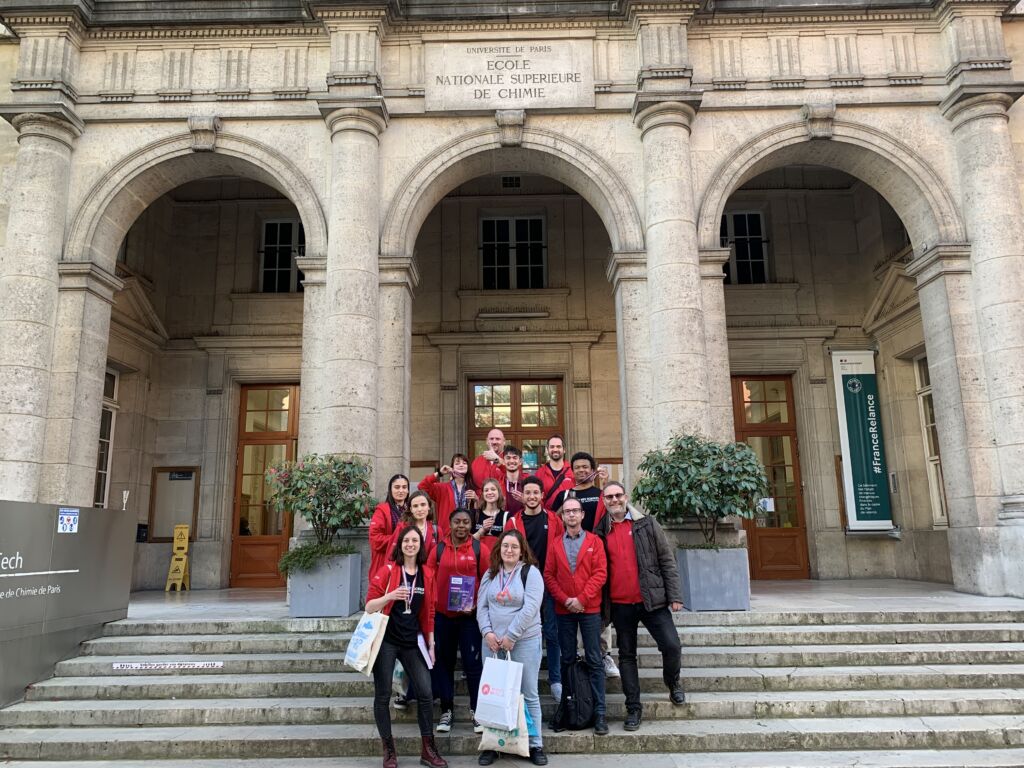The bronze formula by UM chemists
On March 27, ten students from the Faculty of Chemistry caused a surprise by winning third place in the French Chemists' Tournament. As the only university represented in a competition dominated by the grandes écoles, they carried on the tradition of alchemists by transforming their iron will... into a bronze medal.
"This tournament is a somewhat exclusive club for prestigious universities, but this year we managed to sneak into the selection," explains Jean-Sébastien Filhol. For this Professor the chemistry department of the Faculty of Sciences in Montpellier, the goal of participating in the competition was twofold: to introduce a bit of competition into the teaching by offering this challenge to students and, above all, "to show them that they have no reason to feel inferior to students from engineering schools." He was surrounded by a teaching team that was just as enthusiastic as he was: Jean-Yves Winum, Claude Niebel, and Sébastien Clément. All that remained was to recruit students...
Eight compulsory topics
A call for applications was launched in January, and very quickly the dream team took shape. There are ten of them: Méritxell, Hugo, Bruna, Louise-Marie, Anthony, Omeima, Laura, Lilian, Maria, and Audrey. They are all enrolled in master's programs in chemistry, specializing in biomolecules, separative chemistry, or materials."What motivated us was the idea of deepening our skills, conducting experiments, and networking, "explains Bruna. " Teamwork and competition then became the driving forces." And the small group got off to a flying start. They had only three months to prepare the eight assigned topics.
Cooking an egg without heat; presenting a blue, edible orange; capturing ultraviolet rays on photographic paper; creating a non-toxic green pigment; and even proposing an olfactory formula for water: these are just some of the challenges that young chemists at UM have had to tackle. At lunchtime and in the evening, as soon as their classes allow them a little free time, they work tirelessly on their projects and meet every Wednesday over pizza to present their results and practice their oral presentations. "In the end, I was on the computer all day, all the time," says Laura. "It wasn't just a game," continues Jean-Sébastien Filhol, " it was real professional preparation."
The Art of Contradiction
On the big day, they were ready to take on the six other teams from the country's top schools: ENS Ulm, Lyon, and Paris Saclay, as well as the engineering schools Chimie Paris Tech, ESCPI, and École Polytechnique. "We have to admit that the others looked down on us a little," jokes Jean-Yves Winum. The rules of the game are simple: the students compete in four debates on one of eight topics prepared in advance. While one team presents its findings and experiences in a 12-minute presentation, the other team has the same amount of time to prepare its counterarguments, before switching sides in a return match on another topic.
" It's quite an art, " says Bruna, winner of the contradiction prize in this tournament. "While the other team is presenting, you have to do all the bibliographic research on their topic, note the strengths and weaknesses, and put together a slideshow to suggest areas for improvement." "Contradiction is a job in itself," adds Claude Niebel. " You have to absorb everything the other person says, use your scientific knowledge to fill in the gaps, and know how to promote yourself without dismantling your opponent." All of this, of course, in front of a jury of professionals made up of scientists and industrialists.
Another image of chemistry
An organic green chili pepper, a blue orange created by extracting natural polyphenols from wine, and an egg cooked in vodka. The solutions proposed by the students impressed the jury so much that they awarded them third place, which their competitors probably did not expect. "They introduced a sustainable development dimension into the technical solutions they created, demonstrating that chemistry can help solve today's problems," says Jean-Yves Winum. For Sébastien Clément, "beyond technical performance, the value of this competition is also to give the public a more accessible, more concrete image of chemistry. This is essential at a time when science is increasingly being called into question."
As for the students, they will approach the rest of their studies with the conviction that they are receiving a very high level of education, with a new string to their bow: " In terms of oral skills, we have seen them make incredible progress, which is a real added value for their future professional lives," notes Jean-Sébastien Filhol. "In terms of confidence, it's an incredible boost! Some would never have dared to apply for jobs that are usually reserved for engineers. After this victory, they no longer have any complexes." And that's worth its weight in gold!
